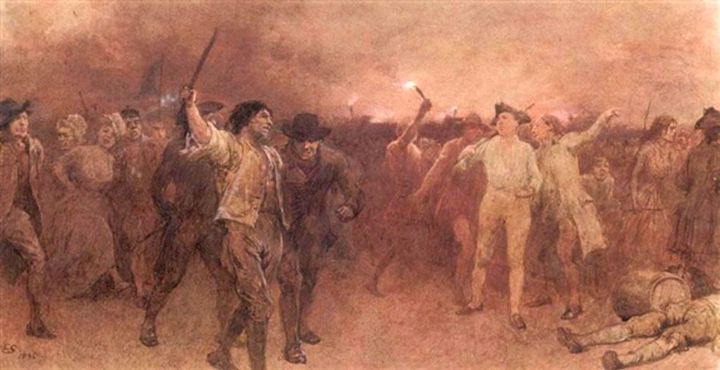The riots by Trump supporters that some people feared would happen after a Biden presidential victory have somehow failed to materialize. Were people boarding up businesses against the supporters of either side, or just one side? Has it ever really been Trump supporters who were rioting?
So now that some have begun to sing “ding, dong, the witch is dead,” perhaps the rioting will stop, although that would make it look suspiciously as though the riots were not about justice for minorities and were instead a pretext covering the machinations of a particular partisan political party’s return to power.
But perhaps this is too cynical. I have little doubt that many rioters would respond that they are demonstrating for justice and are absolutely not the pawns of any political party. These demonstrations were about justice for minorities. Since for the most part, I’m curious about people’s motivations, this possibility has gotten me thinking.
Some years ago, I wrote an article complaining about graffiti. I proposed a thought experiment – admittedly, ignoring the Christian command to “Do unto others,” just for the sake of argument. It involved finding the house of one of these graffiti “artists” and, while he was away, painting some odd, indecipherable words in big, bulbous letters on his living-room wall, just to give him a sense of what he was forcing everyone else to endure.
For what are probably obvious reasons, I have recently been having a similar fantasy about how to respond to America’s professional class of bourgeois rioters. Would it be wrong to find out where they live and organize long, loud, terrifying “mostly peaceful” demonstrations in their neighborhood outside their houses? And if someone during our “mostly peaceful” demonstration were to, say, throw a rock through their window or burn down some of the local places where they shop, that wouldn’t be our fault, would it?
If they were to complain that we were terrifying children and the elderly in the neighborhood, I suppose we could say, “But we’re demonstrating against injustice! Our actions are justified because we’re taking a stand against rioters who destroy public property and burn businesses that serve poor people in poor neighborhoods.”
And if at that point someone were to ask our rioters whether rioting in order to oppose rioting wasn’t something of a contradiction – engaging in violence as a protest against violence – we would tell them that this was precisely the sort of logic, if it can be called that, which started all the trouble in the first place.
Were the initial rioters to complain: “But it’s not your house and neighborhood, it belongs to someone else,” we’ll say, “Don’t you understand that our mostly peaceful demonstration is meant to redefine our whole conception of property ownership and public protest?”

And if they ask: “But why can’t you redefine the whole conception of property ownership and public protest in your own neighborhood or on your own house?” we will send a severe-looking academic woman from the local university to scold and to inform them that protests must be held in places where the public will notice. Their “disruptive” elements are an important way of motivating social change.
And of course, if any of the professional rioters were to dare come outside in an attempt to protect their houses from rocks being thrown through their windows and graffiti being painted on their front doors, we’ll send the police to arrest them for violating our “rights” to engage in a mostly peaceful counter-riot. Then we’ll post pictures of them on social media, red-faced and angry, trying fecklessly to protect their houses from us as we triumphantly march by. Ho, ho, what rubes.
If any of them were to write something on social media complaining about their treatment, we’ll put a “hold” on it until we can make sure that they’re not planning a counter-counter-demonstration – which might be construed as encouraging “violence.”
Eventually, some of the professional rioters would probably give up trying to convince us that we need to have respect for their property, for things that don’t belong to us. And having realized that there’s no one who is going to hold anyone accountable for the damage, they would probably fix those broken windows and clean the graffiti off their houses.
But that’s when things really get interesting. Because that’s when we go back to their neighborhood, night after night, to demonstrate – mostly peacefully – as if to tell them: “No, no, dear Rioters, you are never, ever going to be rid of us. However long it takes you to re-build your houses and your neighborhood, it only takes seconds for us to burn it all down again.”
They, feeling violated, would likely say to themselves: “The first time might have been an expression of frustration with society. But rioting again and again after we’ve repaired things is just cruel. This is simply their way of saying they don’t care what anybody else thinks or wants; it only matters what they want.”
And that’s when we say, “Exactly!”
So for heaven’s sake, dear rioters, stop fooling yourself that your riots are helping the poor and disadvantaged when they are really about trying to make yourselves feel as though you are doing something “meaningful” and “important” by expressing self-righteous indignation and your superiority over those you imagine aren’t as enlightened as you. That’s not helping anyone, but especially not the people you say you want to help.
So do what the people who actually care about other people do. Go home. Work hard. Care for your family. Pay your taxes. Help build your neighborhood and help others rebuild theirs. Care for people in need. Treat others the way you would want to be treated. Someone worth paying attention to once said that. And be the justice you want to inspire in others.
*Image: The Gordon Riots by Charles Green, 1896 [private collection]. The anti-Catholic riots took place in London in 1780, a reaction to laws that eased official discrimination against “papists.” Edmund Burke wrote of the riots as a “Wild and savage insurrection [that] quitted the woods, and prowled about our streets in the name of reform . . .”
















